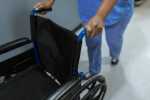There is a massive nursing shortage being faced by countries all around the world. The ever-increasing population means more resources and professionals in the healthcare sector are needed. Though healthcare as a whole suffers from massive shortages, the shortage is felt most keenly within nursing.
Nurses make up for half the global healthcare workforce. Globally it is estimated that there will be a shortage of between 7 million and 13 million.
A global shortage indicates a global issue. Many professionals believe that to offset this shortage, and finally make headway with improving healthcare as a whole, a global solution is necessary.
Education, Nursing / 30.04.2021
How to Change Your Career and Become a Nurse
It is not unusual to hit a slump in our careers and realize that we may have taken the wrong career path. This could be because our initial drive and ambitions were focused on the wrong thing (e.g., aiming for a job purely because of its high salary, for example), and has now caused you to dislike and regret heading to work each morning. While salary is important as you need to be able to look after yourself and pay for a house but also have money left over to treat yourself, you also need to work in a job and industry that you enjoy. Working in a job that brings you little to no joy can cause you to feel depressed. This can be dangerous, as it can lead to mental and physical health problems that could impact your quality of life. At the end of the day, everyone deserves to work a job that they love and brings them happiness.
Changing your career, however, can be a daunting prospect for many. This can be especially true if you are wanting to make a massive leap from one industry to another, or into an industry like healthcare which requires a lot of education, degrees, and training. Remember, though, that if the role of becoming a nurse seems like the right job for you, the heartache of making the transition will be worth it in the end.
Are you looking to change your career and become a nurse but are unsure of the best steps on how to do so? If so, read on for guidance on how you can make the switch as seamless as possible!
(more…)
There are many reasons why people might decide to change their careers. If you have been working in the same position for some time and it’s not as exciting or as rewarding as you hoped it would be, you could be thinking about doing something different. If you want to work in a career where you can make a real difference to the lives of others and enjoy a rewarding work experience every day, nursing could be the ideal option for you. Nursing is a highly satisfying career option with a high demand due to the nursing shortage in the US. Here are some of the key things to consider before you switch your career to nursing.
 As a specialized healthcare position where you will be responsible for the health and wellbeing of patients, nurses are required to hold a degree and a license before they can begin work. To qualify as a registered nurse, you will need to obtain a BSN degree, which typically takes around four years when studying full-time. However, if you already have a bachelor’s degree in another subject, there is an option that will allow you to become a nurse in half the time; accelerated nursing programs are designed for those who already have a bachelor’s degree and want a quick career change into nursing. The top accelerated nursing programs can be found via this link.
(more…)
As a specialized healthcare position where you will be responsible for the health and wellbeing of patients, nurses are required to hold a degree and a license before they can begin work. To qualify as a registered nurse, you will need to obtain a BSN degree, which typically takes around four years when studying full-time. However, if you already have a bachelor’s degree in another subject, there is an option that will allow you to become a nurse in half the time; accelerated nursing programs are designed for those who already have a bachelor’s degree and want a quick career change into nursing. The top accelerated nursing programs can be found via this link.
(more…)
Training as a Nurse
 As a specialized healthcare position where you will be responsible for the health and wellbeing of patients, nurses are required to hold a degree and a license before they can begin work. To qualify as a registered nurse, you will need to obtain a BSN degree, which typically takes around four years when studying full-time. However, if you already have a bachelor’s degree in another subject, there is an option that will allow you to become a nurse in half the time; accelerated nursing programs are designed for those who already have a bachelor’s degree and want a quick career change into nursing. The top accelerated nursing programs can be found via this link.
(more…)
As a specialized healthcare position where you will be responsible for the health and wellbeing of patients, nurses are required to hold a degree and a license before they can begin work. To qualify as a registered nurse, you will need to obtain a BSN degree, which typically takes around four years when studying full-time. However, if you already have a bachelor’s degree in another subject, there is an option that will allow you to become a nurse in half the time; accelerated nursing programs are designed for those who already have a bachelor’s degree and want a quick career change into nursing. The top accelerated nursing programs can be found via this link.
(more…)
Education, Nursing / 16.04.2021
How to Switch to Nursing as a Second Career
Recent events have pushed the nursing profession back to the forefront and more people than ever are considering the position. There is also a growing respect for nurses and their role in society, and nursing has become a mission for many. Some people may want to join the ranks and see how they could help. Thankfully, nursing is a field that is welcoming of people from all professional backgrounds, and no matter what your expertise is, chances are you'll be able to apply some of it in nursing. Here's how you can switch to nursing as a second career.
 Nursing is a job like no other and you need to have a specific set of skills to succeed. You might have all the best intentions in the world, but it takes a special kind of person to be a nurse, so you have to assess your personal and professional skills before making the jump.
For one, this is a job where you will routinely have to deal with loss and grief, so if you don't have a strong enough disposition, you won't be able to make it in this field. However, you still need to be compassionate to help patients and their loved ones get through a tough diagnosis and death. Nurses have to be able to juggle between being human and emotionally available, and being able to separate their work from their personal lives.
As well as this, you will need to be a good communicator. If you're not a people person or are introverted, you might have to look at either another field or positions where you won't have to interact as much. But, in most cases, jobs will require that you give direct assistance to patients. As a matter of fact, you will have a much closer relationship with patients than they may have with their doctor.
You will need to be able to deal with people coming from different social, economic, religious, and cultural backgrounds. You will need to respect their wishes and beliefs. You also have to be able to offer equal care to all.
Also, you need to know how to work as part of a team. You also have to accept hierarchy and be able to take orders. You might disagree with what someone higher than you is saying, but you have to follow through no matter what. Teamwork is especially important in this business, and you have to think of the unit first and not yourself.
Lastly, you need to be very organized and be able to perform under pressure. You might have to deal with a whole floor full of patients on a double short-handed shift and have to keep track of everything. Your decisions could literally mean life or death, and unless you can deal with that kind of pressure, nursing is not a field you should be pursuing.
(more…)
Nursing is a job like no other and you need to have a specific set of skills to succeed. You might have all the best intentions in the world, but it takes a special kind of person to be a nurse, so you have to assess your personal and professional skills before making the jump.
For one, this is a job where you will routinely have to deal with loss and grief, so if you don't have a strong enough disposition, you won't be able to make it in this field. However, you still need to be compassionate to help patients and their loved ones get through a tough diagnosis and death. Nurses have to be able to juggle between being human and emotionally available, and being able to separate their work from their personal lives.
As well as this, you will need to be a good communicator. If you're not a people person or are introverted, you might have to look at either another field or positions where you won't have to interact as much. But, in most cases, jobs will require that you give direct assistance to patients. As a matter of fact, you will have a much closer relationship with patients than they may have with their doctor.
You will need to be able to deal with people coming from different social, economic, religious, and cultural backgrounds. You will need to respect their wishes and beliefs. You also have to be able to offer equal care to all.
Also, you need to know how to work as part of a team. You also have to accept hierarchy and be able to take orders. You might disagree with what someone higher than you is saying, but you have to follow through no matter what. Teamwork is especially important in this business, and you have to think of the unit first and not yourself.
Lastly, you need to be very organized and be able to perform under pressure. You might have to deal with a whole floor full of patients on a double short-handed shift and have to keep track of everything. Your decisions could literally mean life or death, and unless you can deal with that kind of pressure, nursing is not a field you should be pursuing.
(more…)
Consider If You’re Fit for the Job
 Nursing is a job like no other and you need to have a specific set of skills to succeed. You might have all the best intentions in the world, but it takes a special kind of person to be a nurse, so you have to assess your personal and professional skills before making the jump.
For one, this is a job where you will routinely have to deal with loss and grief, so if you don't have a strong enough disposition, you won't be able to make it in this field. However, you still need to be compassionate to help patients and their loved ones get through a tough diagnosis and death. Nurses have to be able to juggle between being human and emotionally available, and being able to separate their work from their personal lives.
As well as this, you will need to be a good communicator. If you're not a people person or are introverted, you might have to look at either another field or positions where you won't have to interact as much. But, in most cases, jobs will require that you give direct assistance to patients. As a matter of fact, you will have a much closer relationship with patients than they may have with their doctor.
You will need to be able to deal with people coming from different social, economic, religious, and cultural backgrounds. You will need to respect their wishes and beliefs. You also have to be able to offer equal care to all.
Also, you need to know how to work as part of a team. You also have to accept hierarchy and be able to take orders. You might disagree with what someone higher than you is saying, but you have to follow through no matter what. Teamwork is especially important in this business, and you have to think of the unit first and not yourself.
Lastly, you need to be very organized and be able to perform under pressure. You might have to deal with a whole floor full of patients on a double short-handed shift and have to keep track of everything. Your decisions could literally mean life or death, and unless you can deal with that kind of pressure, nursing is not a field you should be pursuing.
(more…)
Nursing is a job like no other and you need to have a specific set of skills to succeed. You might have all the best intentions in the world, but it takes a special kind of person to be a nurse, so you have to assess your personal and professional skills before making the jump.
For one, this is a job where you will routinely have to deal with loss and grief, so if you don't have a strong enough disposition, you won't be able to make it in this field. However, you still need to be compassionate to help patients and their loved ones get through a tough diagnosis and death. Nurses have to be able to juggle between being human and emotionally available, and being able to separate their work from their personal lives.
As well as this, you will need to be a good communicator. If you're not a people person or are introverted, you might have to look at either another field or positions where you won't have to interact as much. But, in most cases, jobs will require that you give direct assistance to patients. As a matter of fact, you will have a much closer relationship with patients than they may have with their doctor.
You will need to be able to deal with people coming from different social, economic, religious, and cultural backgrounds. You will need to respect their wishes and beliefs. You also have to be able to offer equal care to all.
Also, you need to know how to work as part of a team. You also have to accept hierarchy and be able to take orders. You might disagree with what someone higher than you is saying, but you have to follow through no matter what. Teamwork is especially important in this business, and you have to think of the unit first and not yourself.
Lastly, you need to be very organized and be able to perform under pressure. You might have to deal with a whole floor full of patients on a double short-handed shift and have to keep track of everything. Your decisions could literally mean life or death, and unless you can deal with that kind of pressure, nursing is not a field you should be pursuing.
(more…) For many years now, professional nursing has held a unique place in the American health care system. Nurses make up one of the largest health care professions in the U.S. with more than 3.1 million nurses working in diverse fields and settings.
Although most nurses work in health care settings like hospitals, a nurse’s expertise expands well beyond the hospital walls. Working on their own and alongside other healthcare professionals, nurses promote the health of families, individuals, and communities.
Nurses have always played an important role in healthcare settings. However, their role has changed a lot over the years. In the past, nurses had extraordinarily little formal medical training. In fact, nurses learned the medical skills they needed from their mothers or other women in the nursing profession.
Today, the nursing profession has changed for the better. Not only are there extensive training programs available for nurses, but this role now comes with a level of prestige that was not there before. And this is not the only thing that has altered. Technology has also played a huge role in changing this profession for the better. Keep reading below to find out about the history of nursing and how technology has changed the role of nursing. For those seeking additional assistance or support in navigating the complexities of nursing education or academic tasks, exploring resources from reputable nursing paper writing services can offer valuable expertise and assistance in achieving success in the field.
For many years now, professional nursing has held a unique place in the American health care system. Nurses make up one of the largest health care professions in the U.S. with more than 3.1 million nurses working in diverse fields and settings.
Although most nurses work in health care settings like hospitals, a nurse’s expertise expands well beyond the hospital walls. Working on their own and alongside other healthcare professionals, nurses promote the health of families, individuals, and communities.
Nurses have always played an important role in healthcare settings. However, their role has changed a lot over the years. In the past, nurses had extraordinarily little formal medical training. In fact, nurses learned the medical skills they needed from their mothers or other women in the nursing profession.
Today, the nursing profession has changed for the better. Not only are there extensive training programs available for nurses, but this role now comes with a level of prestige that was not there before. And this is not the only thing that has altered. Technology has also played a huge role in changing this profession for the better. Keep reading below to find out about the history of nursing and how technology has changed the role of nursing. For those seeking additional assistance or support in navigating the complexities of nursing education or academic tasks, exploring resources from reputable nursing paper writing services can offer valuable expertise and assistance in achieving success in the field.
How Nursing Has Changed Over Time
Time has done a lot for many career paths. However, the nursing profession has seen more changes than most. Here are some of the ways the nursing profession has changed over time: Training – in the past, nurses were not required to have any formal education. However, nowadays nurses are no longer able to care for patients without passing the correct certification first. Setting – many years ago, nurses would take care of people in their homes or on the battlefield. Although some nurses still care for patients in their homes, nowadays, most nurses work in a hospital setting. Responsibilities – nursing responsibilities have come a long way from the early days when they used to look a lot like a household chore list. The change in responsibilities for nurses stems from several changes in the profession, including the changing views of women, more comprehensive training, and the growing demand for medical professionals. Culture – in the 20th century, nursing culture was known as being mainly made up of females who had a small amount of medical knowledge. While nursing culture has not changed completely, it has changed a lot over the years. In fact, research suggests that more men than ever are choosing to train in this profession. Patient care – patient care is more important than ever before. The advancements in technology have created an environment that makes patient care more helpful and efficient for patients. These advancements have altered almost every industry in the U.S. and the medical field is no different. (more…)
Education, Nursing / 18.02.2021
How to Progress Your Career in Nursing- A Guide
Though it is not always necessary to have clear-cut goals for your career, it does wonders for your efforts if you know the general vicinity of where you want to end up. When you know this, you can make the right decisions both in your career and in your personal life to help you achieve your goals.
In most professions, this is still very subjective, but if you work in healthcare (particularly as a physician or a nurse), then your way forward is rather simple. You still have plenty of options and opportunities to customize your career, both in terms of what you do and where you do it, but because of the sheer amount of training necessary, it is a good idea to be confident in your career choices from the outset.
This guide will help you to track where you want to go in your nursing career and see your goals successfully attained. Just remember to take your time, mind your health and wellbeing, and never give up:
Know Your Options
The most important part of starting a new career is to know your options. It is not always easy, especially if your career is new or subjective, but in careers like nursing, your choices are all available on the table. You cannot start a new nursing role because the state and the government need to ratify that role first. It does put some constrictions, but many would admit knowing all their options makes it much easier to find their place. You can always customize your career in small ways but knowing the roles available at the apex of your career can help keep your efforts focused. (more…)
Author Interviews, Education, Nursing / 15.02.2021
Everything You Need to Know About DNP Online Programs
 If you’re currently working as a nurse, you are probably well aware of just how rewarding and fulfilling a job role it can be. You get to help patients from all walks of life every single day and make a real difference to not only people’s health but their lives more generally. It’s also a career in which there is a lot of scope for progression. There are so many different spheres within the field of nursing that you can choose to specialize in, whether it’s a particular age group (like pediatrics or gerontology) or a particular health condition (like oncology or emergency care).
Some of these paths involve training on the job, whereas others require you to return to college to study and obtain a postgraduate qualification. Among these, one of the highest possible qualifications you can aim for is the DNP, or Doctor of Nursing Practice. DNP online programs and campus courses prepare you for a wide range of advanced nursing roles, including both direct patient care and indirect patient care positions. As such, they are a fantastic choice for nurses who want to reach the top levels in their field.
This article will cover everything you need to know about the DNP qualification to help you decide whether it is a degree program that you would like to pursue. This includes more detail about the course itself, the advantages it can bring you, as well as information about eligibility and how to apply.
MedicalResearch.com: What are DNP online programs?
DNP stands for Doctor of Nursing Practice, and it is a doctoral-level qualification in the field of nursing. It’s also a terminal degree, meaning that it is the highest level certification you can achieve in clinical nursing education. The idea of the program is to prepare registered nurses (RNs) for top career positions in areas such as advanced practice nursing, nursing education, healthcare administration, and healthcare policy.
DNP online programs and on-campus courses are becoming more popular, partly because the American Association of Colleges of Nursing has called for the qualification to become a requirement in order to work in advanced practice nursing. Although, in many cases, a Master’s qualification in nursing is sufficient, for those who wish to boost their clinical skills and knowledge to the highest level, a DNP is preferable.
(more…)
If you’re currently working as a nurse, you are probably well aware of just how rewarding and fulfilling a job role it can be. You get to help patients from all walks of life every single day and make a real difference to not only people’s health but their lives more generally. It’s also a career in which there is a lot of scope for progression. There are so many different spheres within the field of nursing that you can choose to specialize in, whether it’s a particular age group (like pediatrics or gerontology) or a particular health condition (like oncology or emergency care).
Some of these paths involve training on the job, whereas others require you to return to college to study and obtain a postgraduate qualification. Among these, one of the highest possible qualifications you can aim for is the DNP, or Doctor of Nursing Practice. DNP online programs and campus courses prepare you for a wide range of advanced nursing roles, including both direct patient care and indirect patient care positions. As such, they are a fantastic choice for nurses who want to reach the top levels in their field.
This article will cover everything you need to know about the DNP qualification to help you decide whether it is a degree program that you would like to pursue. This includes more detail about the course itself, the advantages it can bring you, as well as information about eligibility and how to apply.
MedicalResearch.com: What are DNP online programs?
DNP stands for Doctor of Nursing Practice, and it is a doctoral-level qualification in the field of nursing. It’s also a terminal degree, meaning that it is the highest level certification you can achieve in clinical nursing education. The idea of the program is to prepare registered nurses (RNs) for top career positions in areas such as advanced practice nursing, nursing education, healthcare administration, and healthcare policy.
DNP online programs and on-campus courses are becoming more popular, partly because the American Association of Colleges of Nursing has called for the qualification to become a requirement in order to work in advanced practice nursing. Although, in many cases, a Master’s qualification in nursing is sufficient, for those who wish to boost their clinical skills and knowledge to the highest level, a DNP is preferable.
(more…)
Author Interviews, Pediatrics, Technology / 08.02.2021
Technology That Changed Pediatric Nursing Forever
Veebot is the world’s first robot phlebotomist that helps nurses find an appropriate vein to draw blood from, the first...
Author Interviews, COVID -19 Coronavirus, Occupational Health / 16.11.2020
Nurses Particularly Hard Hit By COVID-19 Infections
MedicalResearch.com Interview with:
Emily Barrett, PhD
Associate Professor
Department of Biostatistics and Epidemiology
Rutgers School of Public Health
MedicalResearch.com: What is the background for this study?
Response: We started this study in the very early stages of the pandemic to look at SARS-CoV-2 viral transmission and disease severity in health care workers as compared to non-health care workers. There was a tremendous amount of fear and uncertainty about the virus and the early anecdotal reports coming out of China and Italy highlighted the plight of many frontline health care workers who had been infected on the job. We knew that our U.S. health care workers would soon be facing this tremendous challenge. We started this study to examine risks of infection in our vulnerable frontline health care workers and a comparison group of non-health care workers. Our results are from the early stages of the U.S. pandemic in March-April 2020. (more…)
Author Interviews, Hospital Readmissions, JAMA, Nursing / 29.01.2019
Not All Hospital Readmissions Are Preventable but READI Protocol Can Assist in Some Cases
MedicalResearch.com Interview with:
Marianne Weiss DNSc RN
READI study Principal Investigator
Professor of Nursing and
Wheaton Franciscan Healthcare / Sister Rosalie Klein Professor of Women’s Health
Marquette University College of Nursing
Milwaukee Wi, 53201-1881
MedicalResearch.com: What is the background for this study? What are the main findings?
Response: Our team of researchers has been studying the association of patient readiness for discharge and readmission for several years. We have previously documented that patients who had ‘low readiness’ on our Readiness for Hospital Discharge Scale were more likely to be readmitted. In this study we added structured protocols for discharge readiness assessment and nurse actions to usual discharge care practices to determine the optimal protocol configuration to achieve improved post-discharge utilization outcomes.
In our primary analysis that included patients from a broad range of patient diagnoses, we did not find a significant effect on readmission from adding any of the discharge readiness assessment protocols. The patient sample came from Magnet hospitals, known for high quality care, and the average all-cause readmission rates were low (11.3%).
In patients discharged from high-readmission units (>11.3%), one of the protocols was effective in reducing the likelihood of readmission. In this protocol, the nurse obtained the patients self-report of discharge readiness to inform the nurse’s discharge readiness assessment and actions in finalizing preparations for discharge. This patient-informed discharge readiness assessment protocol produced a nearly 2 percentage point reduction in readmissions. Not unexpectedly, in lower readmission settings, we did not see a reduction in readmission; not all readmissions are preventable.
In the last phase of study, we informed nurses of a cut-off score for ‘low readiness’ and added a prescription for nurse action only in cases of ‘low readiness’; this addition to the protocol added burden to the nurses’ daily work and eliminated the beneficial effects, perhaps because it limited the nurse’s attention to only a subset of patients.
(more…)
Author Interviews, Gender Differences / 22.08.2018
Why Are There So Few Male Nurses and Kindergarten Teachers?
MedicalResearch.com Interview with:
 Katharina Block, M.A.
Phd Student - Social Psychology
The University of British Columbia
MedicalResearch.com: What is the background for this study? What are the main findings?
Response: Healthcare workers and teachers are incredibly central to how we function as a society. We are having trouble filling these positions, and especially men are underrepresented in them.
In the U.S. men represent only about 10% of nurses and 4% of pre-school and kindergarten teachers. We wanted to know how men’s more basic values play into this.
Our main finding is that tend men see less importance in care-oriented careers then women do, and we find that this could be tied to the more basic values feel are important to them personally. (more…)
Katharina Block, M.A.
Phd Student - Social Psychology
The University of British Columbia
MedicalResearch.com: What is the background for this study? What are the main findings?
Response: Healthcare workers and teachers are incredibly central to how we function as a society. We are having trouble filling these positions, and especially men are underrepresented in them.
In the U.S. men represent only about 10% of nurses and 4% of pre-school and kindergarten teachers. We wanted to know how men’s more basic values play into this.
Our main finding is that tend men see less importance in care-oriented careers then women do, and we find that this could be tied to the more basic values feel are important to them personally. (more…)
 Katharina Block, M.A.
Phd Student - Social Psychology
The University of British Columbia
MedicalResearch.com: What is the background for this study? What are the main findings?
Response: Healthcare workers and teachers are incredibly central to how we function as a society. We are having trouble filling these positions, and especially men are underrepresented in them.
In the U.S. men represent only about 10% of nurses and 4% of pre-school and kindergarten teachers. We wanted to know how men’s more basic values play into this.
Our main finding is that tend men see less importance in care-oriented careers then women do, and we find that this could be tied to the more basic values feel are important to them personally. (more…)
Katharina Block, M.A.
Phd Student - Social Psychology
The University of British Columbia
MedicalResearch.com: What is the background for this study? What are the main findings?
Response: Healthcare workers and teachers are incredibly central to how we function as a society. We are having trouble filling these positions, and especially men are underrepresented in them.
In the U.S. men represent only about 10% of nurses and 4% of pre-school and kindergarten teachers. We wanted to know how men’s more basic values play into this.
Our main finding is that tend men see less importance in care-oriented careers then women do, and we find that this could be tied to the more basic values feel are important to them personally. (more…)
Asthma, Author Interviews, Nursing / 30.03.2017
Nurse-Driven Clinical Pathway for Asthma Improves Efficiency, Reduces Length of Stay
MedicalResearch.com Interview with:
Catherine M. Pound MD
The Ottawa Children’s Treatment Centre
MedicalResearch.com: What is the background for this study?
Response: Asthma is the most common chronic disease of childhood and contributes to a large portion of Canadian hospital pediatric admissions. Once patients are admitted to hospitals, they receive salbutamol, a medication used for acute asthma exacerbations, at a pre-determined frequency. In most hospitals, physicians are the ones to decide of the frequency of administration of the salbutamol, and they decide when to wean patients off it. However, children whose salbutamol treatment administration can be decreased are usually considered stable, and often do not require immediate medical attention, which may results in delays in reassessments as well as administration of unneeded salbutamol treatments, particularly if physicians are busy looking after other sicker patients. Additionally, physicians’ assessments of children with asthma and their decisions to wean salbutamol frequency are not standardized, and vary among physicians. Therefore, in order to improve efficiency and standardize patient assessments, we developed a clinical pathway allowing nurses to wean salbutamol for children hospitalized with asthma based on a validated asthma scoring system.
(more…)
Author Interviews, BMJ, Cost of Health Care, Nursing, Outcomes & Safety, University of Pennsylvania / 16.11.2016
Substituting Less Well Trained Assistants For Nurses Increased Hospital Mortality
MedicalResearch.com Interview with:
Dr Linda H Aiken PhD, FAAN, FRCN, RN
Claire M. Fagin Leadership Professor in Nursing
Professor of Sociology, School of Arts & Sciences
Director, Center for Health Outcomes and Policy Research
University of Pennsylvania School of Nursing
Center for Health Outcomes and Policy Research
Philadelphia, PA 19104
MedicalResearch.com: What is the background for this study?
Response: The idea that adding lower skilled and lower wage caregivers to hospitals instead of increasing the number of professional nurses could save money without adversely affecting care outcomes is intuitively appealing to mangers and policymakers but evidence is lacking on whether this strategy is safe or saves money.
(more…)
Author Interviews, Emergency Care, Nursing / 02.09.2016
Nurse-Initiated Protocols Can Improve Timeliness of Care in an Urban Emergency Department
MedicalResearch.com Interview with
Mathew Douma, RN BSN ENC(C) CNCC(C)
Emergency Department, Royal Alexandra Hospital
Edmonton, Alberta, Canada; Masters of Nursing Student
University of Toronto, Toronto
MedicalResearch.com: What is the background for this study?
Response: Many emergency departments experience crowding, which is typically defined as a situation where demands for service exceed the ability of the emergency department to provide quality care in a timely fashion. Typically when patients are waiting in a waiting room they do not undergo diagnostics or treatments. In an effort to speed the process up and reduce the amount of time the patient spends in the emergency department, some facilities have created protocols for diagnostics or treatments typically outside the traditional scope of practice of nursing staff.
Our emergency department had protocols like this for almost 15 years, though we had never evaluated their effectiveness. So an interdisciplinary group in our emergency department updated them and then we set out to evaluate them.
(more…)
Author Interviews, Frailty, Geriatrics, Nursing / 27.06.2016
Self-Reported Assessment Provides Reliable Measure of Frailty
MedicalResearch.com Interview with
Oleg Zaslavsky PhD
Assistant Professor at the department of Biobehavioral Nursing and Health System
School of Nursing
University of Washington
MedicalResearch.com: What is the background for this study? What are the main findings?
Response: Frailty is a common, but serious medical condition among older adults. It is characterized by weight and muscle loss, fatigue, slow walking and low levels of physical activity. It’s important to accurately diagnose and treat frailty, especially because demographic trends show the percentage of U.S. adults age 65 years and older will increase 19% by 2030.
Frailty is commonly assessed by the Cardiovascular Health Study (CHS) frailty phenotype, which includes a set of physical measurements for slowness, weakness, fatigue, low physical activity and body-weight loss. According to the CHS phenotype, individuals with three or more of these characteristics are at increased risk for falls, hip fractures, disability and mortality. Although the CHS phenotype is good for predicting adverse conditions, it requires direct measurement of physical performance. Refining the phenotype so it doesn’t involve physical measurements of patients in a doctor’s office has practical advantages for research and clinical purposes.
For this study, University of Washington School of Nursing researchers worked with Fred Hutchinson Cancer Research Center faculty to refine the Women’s Health Initiative (WHI) frailty phenotype, originally developed in 2005. This new phenotype uses self-reporting from patients instead of measurements of physical performance to determine frailty and associated health outcomes.
In this report, we show that our newly-proposed WHI measuring scheme performs as well as the more complex CHS phenotype in predicting death, hip fractures and falls in older women.
(more…)
Author Interviews, Hand Washing, Hospital Acquired, Nursing / 26.01.2016
Most Nurses Skip Some Infection Control Measures
MedicalResearch.com Interview with:
Donna Powers, DNP, RN
Kransoff Quality Management Institute
North Shore Long Island Jewish Health System
New York, NY
Medical Research: What is the background for this study? What are the main findings?
Dr. Powers: Despite widely published, accessible guidelines on infection control and negative health consequences of noncompliance with the guidelines, significant issues remain around the use of Standard Precautions to protect nurses from bloodborne infectious diseases.
Only 17.4% of ambulatory nurses reported compliance with all nine standards. The nurses represented medicine, cardiology, dialysis, oncology, pre - surgical testing, radiation and urology practices. Compliance rates varied considerably and were highest for wearing gloves (92%) when exposure of hands to bodily fluids was anticipated, however only 63% reported washing hands after glove removal. 68% provided nursing care considering all patients as potentially contagious. Overall, the ambulatory care nurses chose to implement some behaviors and not others, and this behavior puts them at risk for acquiring a bloodborne infection.”
The study also found knowledge of HCV was variable. Although HCV is not efficiently transmitted by sexual activity, more than one in four nurses (26 %) believed that sexual transmission is a common way that HCV is spread. 14 percent believed incorrectly that most people with HCV will die prematurely because of the infection, 12 percent did not know that HCV antibodies can be present without an infection, and 11 percent did not know there are multiple HCV genotypes.
A statistically significant relationship was found between compliance and perception of susceptibility to HCV illness (P = .05) and between compliance and perception of barriers to use of Standard precautions (P=.005).
(more…)
Author Interviews, JAMA, Nursing, Outcomes & Safety, Surgical Research, University of Pennsylvania / 20.01.2016
Better Nursing Environment Linked To Lower Hospital Mortality
More on Nursing Research on MedicalResearch.com
MedicalResearch.com Interview with:
Jeffrey H. Silber, M.D., Ph.D.
The Nancy Abramson Wolfson Professor of Health Services Research
Professor of Pediatrics and Anesthesiology & Critical Care, The University of Pennsylvania Perelman School of Medicine
Professor of Health Care Management
The Wharton School
Director, Center for Outcomes Research
The Children's Hospital of Philadelphia
Philadelphia, PA 19104
Medical Research: What is the background for this study?
Response: We wanted to test whether hospitals with better nursing work environments displayed better outcomes and value than those with worse nursing environments, and to determine whether these results depended on how sick patients were when first admitted to the hospital.
Medical Research: What are the main findings?
Response: Hospitals with better nursing work environments (defined by Magnet status), and staffing that was above average (a nurse-to-bed ratio greater than or equal to 1), had lower mortality than those hospitals with worse nursing environments and below average staffing levels. The mortality rate in Medicare patients undergoing general surgery was 4.8% in the hospitals with the better nursing environments versus 5.8% in those hospitals with worse nursing environments. Furthermore, cost per patient was similar. We found that better nursing environments were also associated with lower need to use the Intensive Care Unit. The greatest mortality benefit occurred in patients in the highest risk groups.
(more…)
Author Interviews, JAMA, Outcomes & Safety, Urinary Tract Infections, Urology / 19.11.2015
Standardized Model Empowers Nurses To Decrease Urinary Catheter Use
MedicalResearch.com Interview with:
Jerome A. Leis, MD MSc FRCPC
Staff physician, General Internal Medicine and Infectious Diseases
Physician Lead, Antimicrobial Stewardship Team
Staff member, Centre for Quality Improvement and Patient Safety
Sunnybrook Health Sciences Centre
Assistant Professor, Department of Medicine, University of Toronto
Medical Research: What is the background for this study? What are the main findings?
Dr. Leis: Overuse of urinary catheters leads to significant morbidity among hospitalized patients. In most hospitals, discontinuation of urinary catheters relies on individual providers remembering to re-assess whether patients have an ongoing reason for a urinary catheter. We engaged all of the attending physicians to agree on the appropriate reasons for leaving a urinary catheter in place and developed a medical directive for nurses to remove all urinary catheters lacking these indications. This nurse-led intervention resulted in a significant reduction in urinary catheter use and catheter-associated urinary tract infections, compared with wards that continued to rely on usual practice.
(more…)
Author Interviews, Cancer Research, End of Life Care, Nursing / 30.10.2015
End of Life Home Care Nursing Reduces Emergency Department Visits
 MedicalResearch.com Interview with:
Dr. Hsien Seow, PhD
Associate Professor Department of Oncology
Cancer Care Ontario Research Chair in Health Services Research
Associate Member, Department of Clinical Epidemiology & Biostatistics
McMaster University
Canadian Institutes of Health Research Young Investigator
Hamilton, Ontario
Medical Research: What is the background for this study? What are the main findings?
Dr. Seow: Despite being commonplace in healthcare systems, little research has described the effectiveness of publicly-provided generalist homecare nursing to reduce unnecessary acute care use at end-of-life, such as emergency department (ED) visits. It is also unclear how homecare nursing intent, which varies by standard care or end-of-life, affects this relationship. Our study examined a population-based cohort of cancer decedents in Ontario, Canada who used homecare nursing in their last six months of life. Specifically, we examined the relationship between homecare nursing rate in a given week on the ED visit rate in the subsequent week. In our cohort of 54,576 decedents, there was a temporal association between receiving end-of-life nursing in a given week during the last six months of life, and of more standard nursing in the last month of life, with a reduced ED rate in the subsequent week. Homecare nursing for those who are receving end of life care will find that it can provide immediate assistance when needed.
(more…)
MedicalResearch.com Interview with:
Dr. Hsien Seow, PhD
Associate Professor Department of Oncology
Cancer Care Ontario Research Chair in Health Services Research
Associate Member, Department of Clinical Epidemiology & Biostatistics
McMaster University
Canadian Institutes of Health Research Young Investigator
Hamilton, Ontario
Medical Research: What is the background for this study? What are the main findings?
Dr. Seow: Despite being commonplace in healthcare systems, little research has described the effectiveness of publicly-provided generalist homecare nursing to reduce unnecessary acute care use at end-of-life, such as emergency department (ED) visits. It is also unclear how homecare nursing intent, which varies by standard care or end-of-life, affects this relationship. Our study examined a population-based cohort of cancer decedents in Ontario, Canada who used homecare nursing in their last six months of life. Specifically, we examined the relationship between homecare nursing rate in a given week on the ED visit rate in the subsequent week. In our cohort of 54,576 decedents, there was a temporal association between receiving end-of-life nursing in a given week during the last six months of life, and of more standard nursing in the last month of life, with a reduced ED rate in the subsequent week. Homecare nursing for those who are receving end of life care will find that it can provide immediate assistance when needed.
(more…)
Author Interviews, BMJ, Nursing / 16.09.2015
12 Hour Shifts May Increase Nursing Burnout
 MedicalResearch.com Interview with:
Chiara Dall'Ora MSc
Nursing and Midwifery Sciences
University of Southampton
Medical Research: What is the background for this study? What are the main findings?
Response: There is a trend for healthcare employers to adopt longer shifts, typically 2 shifts per day each lasting 12 hours. This allows nurses to work fewer shifts each week. Changes are driven by perceived efficiencies for the employer, and anecdotal reports of improved work life balance for employees because they work fewer days per week. However, it is unclear whether these longer shits adversely affect nurses' wellbeing, in terms of burnout, job dissatisfaction, dissatisfaction with work schedule flexibility and intention to leave the job.
We found that when nurses work 12 h shifts or longer they are more likely to experience high burnout, dissatisfaction with work schedule flexibility and intention to leave their job, compared to nurses working 8 h or less. All shifts longer than 8 hours are associated with nurses' job dissatisfaction.
(more…)
MedicalResearch.com Interview with:
Chiara Dall'Ora MSc
Nursing and Midwifery Sciences
University of Southampton
Medical Research: What is the background for this study? What are the main findings?
Response: There is a trend for healthcare employers to adopt longer shifts, typically 2 shifts per day each lasting 12 hours. This allows nurses to work fewer shifts each week. Changes are driven by perceived efficiencies for the employer, and anecdotal reports of improved work life balance for employees because they work fewer days per week. However, it is unclear whether these longer shits adversely affect nurses' wellbeing, in terms of burnout, job dissatisfaction, dissatisfaction with work schedule flexibility and intention to leave the job.
We found that when nurses work 12 h shifts or longer they are more likely to experience high burnout, dissatisfaction with work schedule flexibility and intention to leave their job, compared to nurses working 8 h or less. All shifts longer than 8 hours are associated with nurses' job dissatisfaction.
(more…)
Author Interviews, BMJ, Brigham & Women's - Harvard, Fertility, Nursing, Occupational Health / 08.08.2015
Long Work Week, Heavy Lifting Linked To Decreased Fertility in Nurses
 MedicalResearch.com Interview with:
Dr. Audrey J Gaskins
Department of Nutrition
Harvard T.H. Chan School of Public Health
Boston, MA
Medical Research: What is the background for this study? What are the main findings?
Dr. Gaskins: Previous studies have linked shift work, long working hours, and physical factors to an increased risk of menstrual cycle disturbances, spontaneous abortion, preterm birth, and low birth weight; however the association with fecundity is inconsistent. Several papers have also reviewed the occupational exposures of health care workers and concluded that reproductive health issues are a concern. Therefore we sought to determine the extent to which work schedules and physical factors were associated with fecundity in a large cohort of nurses. Women who work in an industry that requires them to work from a height or even lift heavy objects requires them to undertake training which guides them though the effective stages on how to work safely at heights. Without the right training, this sort of work can become very dangerous.
Our main findings were that that working >40 hours per week and moving or lifting a heavy load >15 times per day (including repositioning or transferring patients) were associated with reduced fecundity in our cohort of female nurses planning pregnancy. However, all other factors such as frequency of night work, duration of rotating and non-rotating night shifts, and time spent walking or standing at work were not significantly associated with fecundity in this cohort.
(more…)
MedicalResearch.com Interview with:
Dr. Audrey J Gaskins
Department of Nutrition
Harvard T.H. Chan School of Public Health
Boston, MA
Medical Research: What is the background for this study? What are the main findings?
Dr. Gaskins: Previous studies have linked shift work, long working hours, and physical factors to an increased risk of menstrual cycle disturbances, spontaneous abortion, preterm birth, and low birth weight; however the association with fecundity is inconsistent. Several papers have also reviewed the occupational exposures of health care workers and concluded that reproductive health issues are a concern. Therefore we sought to determine the extent to which work schedules and physical factors were associated with fecundity in a large cohort of nurses. Women who work in an industry that requires them to work from a height or even lift heavy objects requires them to undertake training which guides them though the effective stages on how to work safely at heights. Without the right training, this sort of work can become very dangerous.
Our main findings were that that working >40 hours per week and moving or lifting a heavy load >15 times per day (including repositioning or transferring patients) were associated with reduced fecundity in our cohort of female nurses planning pregnancy. However, all other factors such as frequency of night work, duration of rotating and non-rotating night shifts, and time spent walking or standing at work were not significantly associated with fecundity in this cohort.
(more…)
Author Interviews, Cost of Health Care, Geriatrics, Nursing / 11.12.2014
Home Based Nurse Care Coordination Improved Outcomes and Reduced Costs
 MedicalResearch.com Interview with:
Karen Dorman Marek, PhD, MBA, RN, FAAN
Bernita 'B' Steffl Professor of Geriatric Nursing
Arizona State University
College of Nursing & Health Innovation
Phoenix, AZ 85004-0696
Medical Research: What is the background for this study? What are the main findings?
Response: For many older adults, self-management of chronic illness is an overwhelming task, especially for those with mild cognitive impairment or complex medication regimens. The purpose of this study was to evaluate cost outcomes of a home-based program that included both nurse care coordination and technology to support self-management of chronic illness, with as an emphasis on medications in frail older adults. A total of 414 older adults, identified as having difficulty self-managing their medications, were recruited at discharge from three Medicare-certified home health care agencies in a large Midwestern urban area. A prospective, randomized, controlled, three-arm, longitudinal design was used. A team consisting of both Advanced Practice Nurses (APNs) and Registered Nurses (RNs) coordinated care to two groups: home-based nurse care coordination (NCC) plus mediplanner group and NCC plus the MD.2 medication-dispensing machine group. Major findings were:
MedicalResearch.com Interview with:
Karen Dorman Marek, PhD, MBA, RN, FAAN
Bernita 'B' Steffl Professor of Geriatric Nursing
Arizona State University
College of Nursing & Health Innovation
Phoenix, AZ 85004-0696
Medical Research: What is the background for this study? What are the main findings?
Response: For many older adults, self-management of chronic illness is an overwhelming task, especially for those with mild cognitive impairment or complex medication regimens. The purpose of this study was to evaluate cost outcomes of a home-based program that included both nurse care coordination and technology to support self-management of chronic illness, with as an emphasis on medications in frail older adults. A total of 414 older adults, identified as having difficulty self-managing their medications, were recruited at discharge from three Medicare-certified home health care agencies in a large Midwestern urban area. A prospective, randomized, controlled, three-arm, longitudinal design was used. A team consisting of both Advanced Practice Nurses (APNs) and Registered Nurses (RNs) coordinated care to two groups: home-based nurse care coordination (NCC) plus mediplanner group and NCC plus the MD.2 medication-dispensing machine group. Major findings were:
- Total Medicare costs were $447 per month lower in the NCC + mediplanner group (p=0.11) when compared to the control group.
- For participants in the study at least 3 months, total Medicare costs were $491 lower per month in the NCC + mediplanner group (p=0.06) compared to the control group.
- The cost of the NCC intervention was $151 per month, yielding a net savings of $296 per month or $3552 per year for the NCC + mediplanner group.
- Participants who received the nurse care coordination intervention scored significantly better than the control group in depression (p < 0.001), functional status (p < 0.001), cognition (p < 0.001), and quality of life (p < 0.001) than participants in the control group.
Author Interviews, Nursing / 22.09.2014
Longer Shifts and Overtime May Lead To Lower Quality and Safety of Nursing Care
 MedicalResearch.com Interview with:
Dr. Peter Griffiths PhD, RN
Centre for Innovation and Leadership in Health Sciences
University of Southampton, Southampton, UK
Medical Research: What are the main findings of the study?
Dr. Griffiths: This study found that hospital nurses who are working on a 2 shift system, where care is provided by nurses working long shifts of 12-13 hours, report lower quality and safety of care than nurses who work a traditional three shift system where nurses typically work shifts of 8 hours. We also found that nurses who were working overtime reported lower quality and safety of care. We found that these shifts are common in some European countries – most notably Poland, Ireland and England.
(more…)
MedicalResearch.com Interview with:
Dr. Peter Griffiths PhD, RN
Centre for Innovation and Leadership in Health Sciences
University of Southampton, Southampton, UK
Medical Research: What are the main findings of the study?
Dr. Griffiths: This study found that hospital nurses who are working on a 2 shift system, where care is provided by nurses working long shifts of 12-13 hours, report lower quality and safety of care than nurses who work a traditional three shift system where nurses typically work shifts of 8 hours. We also found that nurses who were working overtime reported lower quality and safety of care. We found that these shifts are common in some European countries – most notably Poland, Ireland and England.
(more…)
Author Interviews, Nursing, Outcomes & Safety / 26.08.2014
Nursing Home Culture Change Reduced Hospitalizations, Feeding Tubes and Bedsores
 MedicalResearch.com Interview with:
Susan Miller, PhD
Professor of Health Services, Practice and Policy (Research) at the Center for Gerontology and Health Care Research
The Warren Alpert Medical School of Brown University
Medical Research: What are the main findings of the study?
Prof. Miller: Upon introduction of culture change, the nursing homes that implemented culture change most extensively produced statistically significant improvements in the percent of residents on bladder training programs, the percent of residents who required restraints, the proportion of residents with feeding tubes, and the percent with pressure ulcers. They also showed a nearly significant reduction in resident hospitalizations. No quality indicator became significantly worse.
Among homes that implemented less culture change, the only significant improvement occurred in the number of Medicare/Medicaid health-related and quality of life survey deficiencies. Urinary tract infections and hospitalizations got slightly worse.
(more…)
MedicalResearch.com Interview with:
Susan Miller, PhD
Professor of Health Services, Practice and Policy (Research) at the Center for Gerontology and Health Care Research
The Warren Alpert Medical School of Brown University
Medical Research: What are the main findings of the study?
Prof. Miller: Upon introduction of culture change, the nursing homes that implemented culture change most extensively produced statistically significant improvements in the percent of residents on bladder training programs, the percent of residents who required restraints, the proportion of residents with feeding tubes, and the percent with pressure ulcers. They also showed a nearly significant reduction in resident hospitalizations. No quality indicator became significantly worse.
Among homes that implemented less culture change, the only significant improvement occurred in the number of Medicare/Medicaid health-related and quality of life survey deficiencies. Urinary tract infections and hospitalizations got slightly worse.
(more…) MedicalResearch.com Interview with:
Dr. Lianne Jeffs
PhD
Nurse and researcher at St. Michael's Hospital
University of Toronto
MedicalResearch.com: What are the main findings of the study?
Dr. Jeffs: The main findings of the study include:
1. Patients described the bedside nursing handover as engaging, personal and informative. The bedside nursing handover created a a space to connect with their nurses in a more personal manner (e.g., provided an introduction between patient and nurse at the beginning of the shift)
2. Patients found the experience increased their engagement in their own care, and kept them informed about their health status and care plan. It also gave the patient an opportunity to identify important needs to the nurse (e.g., daily activities)
3. Not all patients wanted to participate in the bedside nursing handover. This was typically exemplified by long-term-stay patients.
(more…)
MedicalResearch.com Interview with:
Dr. Lianne Jeffs
PhD
Nurse and researcher at St. Michael's Hospital
University of Toronto
MedicalResearch.com: What are the main findings of the study?
Dr. Jeffs: The main findings of the study include:
1. Patients described the bedside nursing handover as engaging, personal and informative. The bedside nursing handover created a a space to connect with their nurses in a more personal manner (e.g., provided an introduction between patient and nurse at the beginning of the shift)
2. Patients found the experience increased their engagement in their own care, and kept them informed about their health status and care plan. It also gave the patient an opportunity to identify important needs to the nurse (e.g., daily activities)
3. Not all patients wanted to participate in the bedside nursing handover. This was typically exemplified by long-term-stay patients.
(more…)








